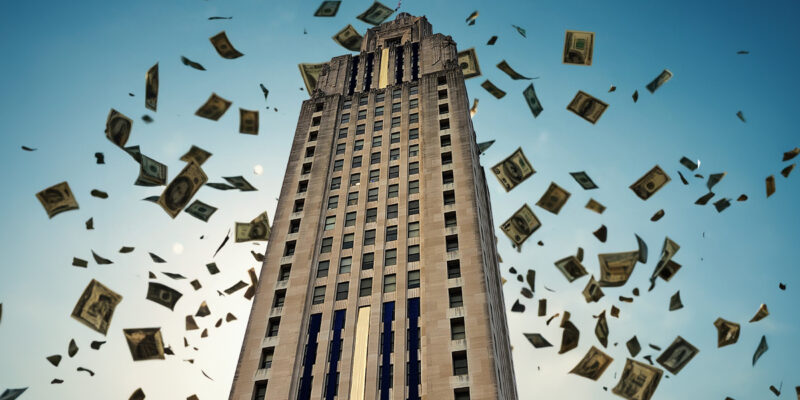(By Nolan Mckendry/The Center Square) — On Tuesday, the House Ways and Means Committee met to consider Gov. Jeff Landry’s recent tax reform proposals, which could overhaul the current tax system in the most significant way in decades.
Landry’s proposals include a flat tax for individuals and businesses alike, while expanding the list of taxed goods and services. Landry hopes the proposals will not only make Louisiana a more competitive state for business, but to also address the projected $1.5 billion budget deficit.
In a news conference last week, Landry said the current tax structure is failing residents and called the frequent budget deficits faced by the state a “disease.”
The legislation, which spans a hefty 500 pages, is the project of the Louisiana Department of Revenue, and models a number of different states, most notably North Carolina, according DOR Secretary Richard Nelson.
“The plan has something for everyone,” Nelson said. “There’s the increase in standard deduction, and the flat rate which makes it better for everyone.”
Under the plan, the standard deduction will increase from $4,500 to $12,500 for a single filer, or $25,000 for filing jointly. The plan will also enact a flat tax rate of 3%, which Nelson said “it gives every resident in Louisiana more money in their pockets.”
Nelson also said that the plan will benefit the bottom 20% of taxpayers, who will have their income tax liability “wiped out.” Nelson estimated that those filers pay $20 million dollars to the state.
“The top 10% currently pay 55% of all income taxes,” Nelson said. “The changes will result in the top 10% paying 61% of all income taxes, and that’s mostly because those bottom payers are all wiped out, and so their share of it actually goes up.”
Other changes include repealing the additional $1,000 deduction for persons age 65 and older, blind and independents and repealing deductions for net capital gains expenses.
Should the constitutional amendment pass, Louisianans would see an additional 0.2% rate reduction and double the standard deduction for persons age 65 and older, from $12,500 to $25,000.
According to Nelson, the proposed reforms are meant to be permanent. Nelson said that the often-temporary nature of Louisiana’s tax structure makes budgeting difficult and hard to project.
“It puts everybody in a position of having to reinvent the wheel every couple of years,” Nelson said.
The plan could also help address the massive budget deficits projected over the next three years. With the lost income tax revenue, teacher stipends and the projected deficit the total revenue needed for a balanced budget is approximately $1.5 billion, according to the DOR.
The plan appears to address the majority by maintaining the current sales tax of 4.45%, the expansion of taxed goods and services, the elimination of some exemptions, business utilities and tax incentives are expected to balance the budget, according to the revenue department.
Some revenue is projected to be unable to meet teacher stipends.
“Let’s call that what it is: A pay cut,” Jan Moller, the executive director of Invest in Louisiana, said. “It’s a pay cut for public school teachers and Louisiana keeps falling farther and farther behind.”
“The marginal decrease in their state income tax is going to make up for the loss of $1,500, $2,000 payrolls,” Moller continued.
“I want to see an independent fiscal analysis of how this adds up for the state budget and how this is going to affect different groups of taxpayers,” Moller told The Center Square. “We know that in general, sales taxes tend to be regressive and that they hit people harder at the bottom of the income scale than at the top.”
The Public Affairs Research Council has hired Greg Albrecht to conduct an independent analysis of the proposals and determine how they would impact taxpayers. Albrecht worked at the Louisiana Legislative Fiscal Office from 1985 to 2022, serving as the office’s chief economist from 1991 until his retirement from state service.
Goods and services already account for a good portion of the middle class’s expenses, begging the question of whether the savings in lower income taxes is offset by taxes levied on a wider range of goods and services.
Assistant Secretary of Revenue Luke Morris said the corporate franchise tax acts as a deterrent to business growth in Louisiana., “It’s a kind of wall around Louisiana, prohibiting investment…especially if you’re a very highly profitable, highly capitalized company.”
The goal, according to Morris, is to create a tax environment that is more attractive to businesses by repealing the corporate franchise tax, potentially costing the state $400 million in revenue.
To offset that lost revenue, the DOR is proposing to repeal the inventory tax, while also eliminating related incentives, could streamline the system and make Louisiana more competitive.
“Eighty-six percent of inventory tax incentive claims go to people who also pay the inventory tax,” Morris explained, meaning that much of the tax revenue from the inventory tax is lost to tax credits, rebates or other incentives.
Landry is expected to convene a special session to pass the bills. Moller worries that this is too much to ask in such a short amount of time.
“You think all 144 legislators are going to read and absorb all the details, including a full rewrite of Article Seven of the Constitution, the longest and most complex of the articles of the Constitution? You think they’re going to have time to digest and evaluate and come to a full understanding of what they’re being asked to do in that time period?”
“Is that conservative?” Moller asked.
The hearings will continue on Wednesday.
Advertisement
Advertisement

